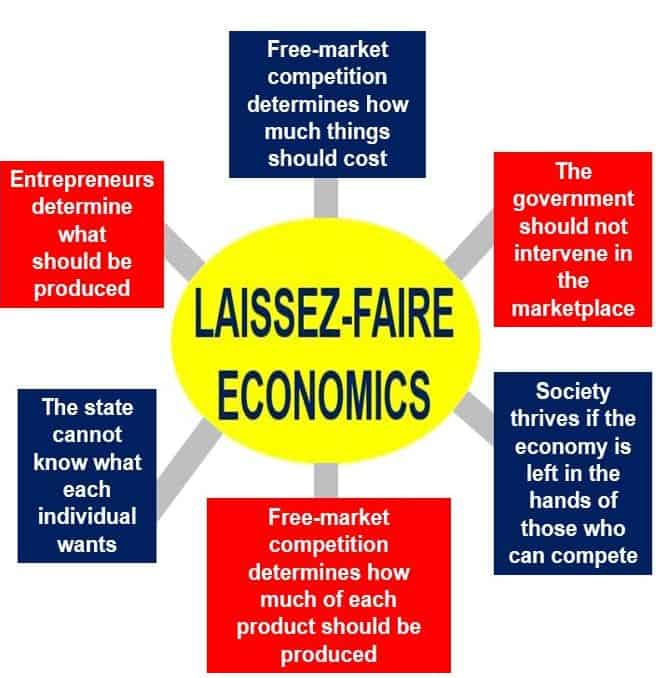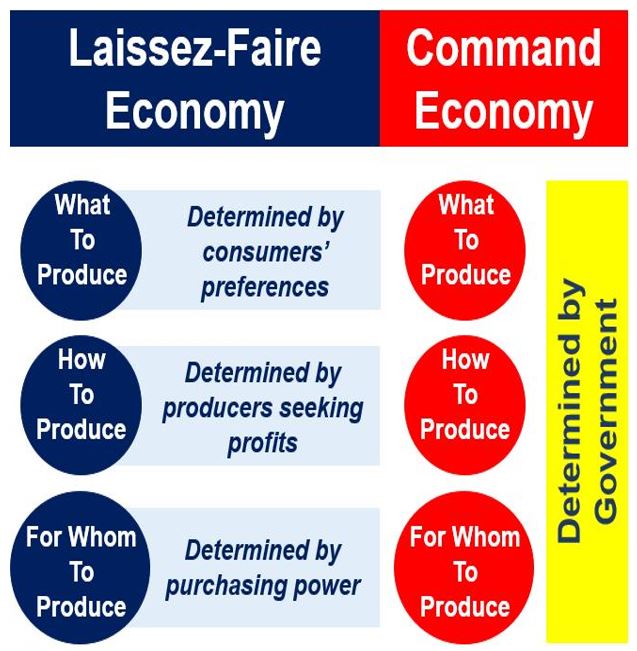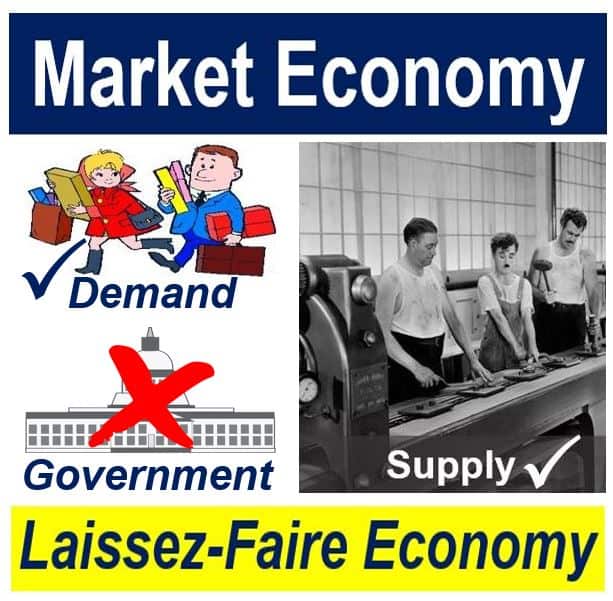What is laissez-faire? Definition and meaning
Laissez-faire, which in French literally means ‘let it happen’ ‘allow to do’, is interpreted in economics as ‘let go’ or ‘let it be economics’.
Laissez-faire is a free-market economic system of thought where the players are free to act without interference from the government.
The economic concept can be traced back to 18th-century French physiocrats who believed that self-interest was the motivation for each segment of the economy to play its part. The physiocrats were among the first to develop a coherent theory of economics.
Adam Smith (1723-1790), a Scottish moral philosopher and pioneer of political economy, known by economists today as the ‘father of modern economics’, turned the laissez-faire notion into a central tenet of classical economics – he said it allowed the Invisible Hand to operate effectively.
None of the famous free-market thinkers in history were as laissez-faire as the French physiocrats. Even Adam Smith and his fellow classical economists saw a need for a government role in a country’s economy.

Friedrich Hayek (1899-1992), an Austrian-British economist and philosopher, a strong advocate of classical liberalism, said that a true, freely competitive, laissez-faire banking industry has the tendency to be pro-cyclical and destabilizing. He believed that countries should have a central bank.
Laissez-faire and individuals
Proponents of laissez-faire economics believe that each individual human being is best suited to determine what goods they want and require, and how to go about getting them through work.
The system works optimally when there is a complementary relationship between different people’s needs and desires, without government interference or trade restrictions, which create artificial barriers to achieving individual goals.
Jacques Claude Marie Vincent de Gournay (1712-1759), a French economist and intendant (high-ranking civil servant) of commerce, popularized laissez-faire – he is believed to have first come across the term from François Quesnay’s writings on China.

The Financial Times’ dictionary of business terms says laissez-faire by definition is:
“The view, backed by supporters of the free market, that economic performance is optimized when there is no government interference. One of the basic tenets of classical economics.”
Laissez-faire axioms
Laissez-faire is based on the following basic postulates:
1. The human individual is the basic unit of society.
2. The human individual is naturally entitled to freedom.
3. The physical order of things should be left to nature, which is both self-regulating and harmonious.
4. Companies are creatures of the State, and therefore must be monitored closely by the citizenry due to their tendency to disrupt the Smithian (Adam Smith’s) spontaneous order (the spontaneous emergence of order out of seeming chaos).
The first advocates of laissez-faire proposed a tax on land rent – Impôt unique – to replace all taxes that undermine welfare by penalizing production.

Laissez-faire – in-out of then in favor
In the first half of the twentieth century, laissez-faire was often quoted as the cause of monopolies and the boom-and-bust cycles of economies.
The popularity laissez-faire economics waned when Keynesian policies of interventionist government spread during the Great Depression of the 1930s.
John Maynard Keynes (1883-1946), a British economist whose ideas fundamentally changed the theory and practice of macroeconomics, criticized laissez-faire on many occasions. He argued that its doctrines were dependent to some extent on improper deductive reasoning.
Whether there should be a market solution or government intervention depends on each situation, Keynes argued, i.e. it should be determined on a case-by-case basis.

It was not until the late 1970s and early 1980s, that laissez-faire came back into fashion in a big way, and was seen as a good and necessary thing – thanks to US President Ronald Reagan and British Prime Minister Margaret Thatcher.
Today, most governments of the rich nations accept that too much government intervention harms the economy.
However, when the Global Financial Crisis of 2007/8 hit, all conservative-leaning political parties rapidly abandoned their free-market tenets and bailed out their failing banks to the tune of trillions and trillions of dollars.
Perhaps for the first time ever, the tables had completely turned. Most non-banker taxpayers – working and middle class salaried men and women – resented the massive-scale government intervention, while lawmakers – those with power – tried to convince them why it had to be done.
It was one of the very few times in history that workers favored a laissez-faire approach to the problem, while the rich and powerful supported government intervention.
French in business English
There are many French words and phrases in the English language. During the 11th to 14th centuries in England, the aristocracy spoke French, the Church spoke Latin, and the proletariat (common people) spoke Old English (Anglo-Saxon).
As the aristocracy shifted over to speaking English, numerous French words and expressions were assimilated into the English language.
Here are three examples in the world of business:
- Entrepreneur
Someone who starts and manages a business, assuming significant financial risks.
Example Sentence: “The young entrepreneur launched her startup in the tech industry, rapidly gaining recognition for her innovative approach.”
- Bureau
An office or department handling specific business, often within government or finance
Example Sentence: “The Consumer Financial Protection Bureau plays a critical role in regulating financial products and services in the United States.”
- Par excellence
The best example of a particular quality or class.
Example Sentence: “Warren Buffett is often regarded as the investor par excellence, with his exceptional acumen and successful track record in the stock market.”
Video – What is Laissez-Faire?
This video, from our YouTube partner channel – Marketing Business Network, explains what ‘Laissez-Faire’ is using simple and easy-to-understand language and examples.

